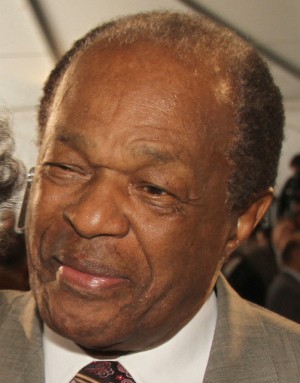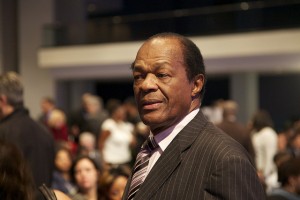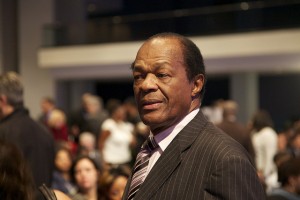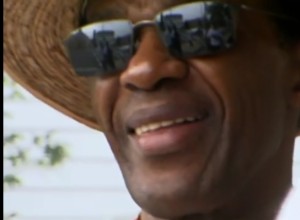On Tuesday, local blog Greater Greater Washington tweeted that the Lumen8Anacostia could signal “a new dawn for Anacostia” and Washington City Paper pondered whether Anacostia could be the next Williamsburg. That sparked a conversation between locals, including Ward 8 Councilman Marion Barry, about gentrification, displacement, race and the arts.
Marion Barry
RECENT POSTS
Asian Shopkeepers And The Economics Of Improving Corner Stores

A D.C. shopkeeper poses by his "Healthy Corners" stand. D.C. Central Kitchen's program delivers fresh produce to corner stores.
The fallout continues over comments Councilman Marion Barry made about Asian-owned stores in Ward 8, calling them “dirty shops.” Barry has since issued an apology, but a coalition of local and national Asian American groups have called for more meaningful engagement.
Part of Barry’s follow-up comments focused on the unhealthy foods such stores sell, and he called for the owners to sell healthier foods and fix up their stores.
Gary Cha, owner of Yes! Organic Market and former president of the Korean American Grocers Association, appeared on Monday’s The Kojo Nnamdi Show to discuss Barry’s comments and relations between black and Asian communities in D.C.
Cha spoke with DCentric after the show and reiterated that a common perception of store owners among customers is that whatever goes into the register is profit. But many take home only 6 to 7 percent of sales, Cha said. If a store makes $1 million a year, the owners take away about $60,000 for their families.
“These are people who are barely getting by. I know several of them that to make ends meet, they don’t even have health insurance,” Cha said. “So when we ask them to renovate and do this and that, they probably don’t have the financial ability to do that.”
Stocking up with healthier foods, particularly fresh produce, does require investment by store owners. Refrigeration units are needed, which can be costly and difficult to accommodate in small stores. Also, small stores may not qualify for wholesale produce prices.
Marion Barry: Breaking Down Race, Plexiglass And ‘Dirty Shops’
Councilman Marion Barry’s criticisms of Asian-owned stores in Ward 8 set off a whirlwind of criticism and debate Thursday. Here’s the rundown: Barry made some offhanded remarks after he won the contested Ward 8 council seat race, captured by NBC4 Washington: “We’ve got to do something about these Asians coming in, opening up businesses, those dirty shops. They ought to go, I’ll just say that right now, you know. But we need African-American businesspeople to be able to take their places, too.”
On Thursday, Barry’s Twitter account clarified his criticism, aiming it at carry-out joints that sell greasy food and put up plexiglass barriers between customers and employees. And many of such restaurants, he said, are owned by Asians. Barry faced criticism throughout Thursday, including denunciations from Councilman Tommy Wells (Ward 6), Council Chair Kwame Brown and Mayor Vincent Gray. Barry eventually apologized for offending the Asian American community. Barry said he intended to criticize some, not all, Asian-owned businesses, but he remained staunch in his view that Ward 8 deserves better food options and less plexiglass.
Part of Barry’s scourge centers on the feeling that predominately black Ward 8 is often disrespected, and that feeling is at the heart of many issues east of the Anacostia River. By bringing race into the mix, Barry touched upon a history of animosity. In many cities, some view Asian grocers and liquor store owners in predominately black communities as profiting off of customers while not treating them with respect.
Does D.C. Need Gentrification Commmissions?
When neighborhoods get gentrified, the most vulnerable are often caught off guard. Community activism doesn’t typically gain steam until the prospect of being displaced is eminent.
So Ward 8 Councilman Marion Barry’s idea to convene a gentrification commission is interesting, particularly since Ward 8 isn’t really being gentrified. Sure, some wealthier residents have moved in, but residents are rarely being displaced as a result. There is some development in the pipeline, but it’s uncertain what kind of effect it’ll have on the area
“My problem with gentrification is that those persons come into our community and displace longtime residents,” Barry said during Wednesday’s gentrification panel discussion. “Shaw is a classic example. We saw it coming and we did virtually nothing.”
Ward 8 is ripe for gentrification, Barry said, particularly given the high number of renters. Panel speakers referred to gentrification as a looming, unstoppable force. Yes, there were some mentions of dogs and bikes, and Barry remarking that “we have a lot of gentrifiers who are blogging, who are twittering.” Most of the discussion didn’t focus on race, but rather on protecting residents from being displaced through addressing the root causes of poverty: education, jobs and whether residents have become dependent on government assistance.
Black Home Ownership and ‘the American Dream’ in Ward 8
D.C. Councilman Marion Barry wants to encourage home ownership in majority black Ward 8, where only 24 percent of residents are homeowners. How? By banning construction of new apartment buildings. He tells Washington City Paper‘s Lydia DePillis:
“The American dream is to own a home. And black people have not gotten the American dream as much as they need to,” Barry says. “Somebody can rent for 20 years, and has no equity in their unit at all.”
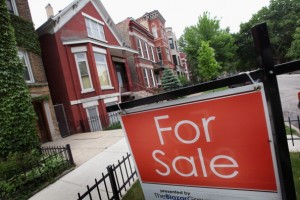
Scott Olson / Getty Images
Renters are the most vulnerable to forces of redevelopment and gentrification, since they can’t really profit from leaving a neighborhood with exploding housing prices the way a homeowner can. But owning a home, and having equity tied to it, doesn’t necessarily buffer one from poverty, either. As noted yesterday, one of the contributing factors to the decline of the black middle class is the fact that African Americans generally had more of their wealth tied up in housing than white people did at the start of the recession — 63 percent versus 38.5 percent. Declining housing prices and foreclosures meant the loss of a lot of black wealth — between 2004 and 2009, the median net worth for black households dropped by 83 percent. For white households, it dropped by 24 percent.
On the other hand, the value of homes in D.C. as a whole hasn’t dropped at drastic levels since the peak of the bubble. Only a few portions of Ward 8 saw home values decline at higher rates than the national metro area average.
Even still, there are plenty of questions as to whether banning new apartment construction would even be effective in increasing home ownership. Matthew Yglesias of ThinkProgress writes:
There’s just no way that zoning policy in Ward 8 of Washington, DC could possibly influence black people’s ability to own homes. Banning apartment buildings will reduce the supply of affordable housing and reduce construction jobs. That’s it.
Why so many black residents left D.C. and Marion Barry on diversity
D.C. Councilman Marion Barry (Ward 8 ) spoke with Michel Martin on NPR’s Tell Me More program today about D.C.’s dropping black population. Martin tried to get Barry to explain his call to stop gentrification as quoted in a Washington Post article from last week.
- Census Shows Exodus Of Blacks From Majority Black CitiesMarion Barry explains gentrification comments. Download
The exchange itself is worth a listen, but here are some choice moments:
“What gentrification does is that it displaces longtime residents, longtime people who have been here 10, 20, 25 years and have been renters,” Barry said.
Barry also mentioned that “the Hispanic population grew by 9 percent and we welcome that kind of growth, but this city and other cities have to deal with gentrification.” He goes on to say that “white people… are displacing African American renters, gentrifying the city. I’m not afraid to speak up and say that’s something we have got to deal with.”
Later, Martin tells Barry “what’s interesting about your perspective here is that you were elected initially as part of a multicultural campaign. With your initial campaign you had strong support from a number of multiracial communities, including the gay community which often has been on the leading edge of revitalizing neighborhoods that have previously been in disrepair. So for some people, it’s why all of a sudden now you’re critical of the very people who supported you initially.”
“The Nine Lives of Marion Berry” is on Hulu
Just heard about this– a film I’ve wanted to see is now available online, via Hulu. If you haven’t seen “The Nine Lives of Marion Berry” yet, go here and stream for yourself, if you have the capacity to do so. Here’s the blurb from Hulu:
The Nine Lives of Marion Barry tells the saga of this despised, beloved and resilient politician. It’s the story of race, power, sex and drugs, and a man who is the star of one of the most fascinating and bizarre chapters of American politics.
WaPo said this about the HBO documentary:
But what “Nine Lives” has that the great print profiles lack is a delicious collection of archival footage from the 1960s and ’70s. Here’s a young, slim, goateed, dashiki-clad man the newspapers called “Marion S. Barry, Negro militant” at community meetings, asking angry young Washingtonians to rise up with him against police brutality, “dig it.” As Jesse Jackson says in the movie, Barry was “a marching, picketing, protesting, Freedom Riding young man who had that fire.”
Marion Barry, reality show star
We’ll have more on this soon, but I figured this was probably the right way to leave you to your weekend, enjoying DC’s latest reality-show celeb:
(Update 12/13: The YouTube video was made private since this post was published.)
Tax Yoga, Help the Poor?
No one enjoys higher or additional taxes, but judging from some of the pleas for support I’ve received from various groups that are worried about how budget cuts will affect the poorest, youngest, most vulnerable residents of our city, I wonder if taxing yoga and sweet-smelling dogs is preferable (or more ethical). Via the City Paper:
Ward 8 Councilmember Marion Barry wants to extend D.C.’s sales tax to include: pet grooming, health clubs, armored car services, private investigations and admission to live performances.
You’ll recall that similar measures were considered last budget go round, but the all-powerful Yoga lobby put a squash to them.
Barry: “right now, 55 percent of the new hires are not D.C. residents.”
Over at the Afro, Dorothy Rowley writes “District’s Black Residents Remain Hard Pressed to Find Jobs“:
The D.C. Fiscal Policy Institute reported in October that while joblessness surged in part last year for the District’s African-American residents, employment remained relatively steady for its White residents and those with a college degree…
“The city’s high unemployment rate is obviously not going to turn around simply because the overall economy recovers, DCFPI Executive Director Ed Lazere, told the AFRO. “Our leaders have to make this a priority and have to make concerted efforts to address it,” he continued, “and given that the unemployment rates are highest for residents in isolated wards who often have limited jobs skills, it seems pretty logical that concerted efforts would help residents get access to skills – whether it’s through high school, a community college or other means.”
Ward 8 Councilman Marion Barry, agreed. But he said the key to fighting joblessness – particularly in his district – is contingent upon attracting the ears of the private sector and federal government. “The city’s initiative has to be to become more involved with the private sector and the federal government,” Barry said. “There are 700,000 jobs in the District of Columbia and 340,000 of them are with the federal government. The rest are in the private sector, so we have to get the District government to start hiring more city residents because right now, 55 percent of the new hires are not D.C. residents.”




